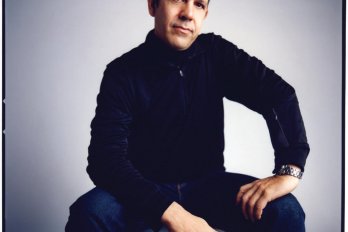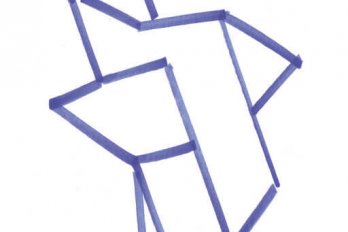When i was sixteen, my father asked me if I’d take a boy out hunting. My father had taught him shop and liked his family. He’s a year older than you, he said, and he’s a hemophiliac. This frightened me, the idea that his insides could spill out. It was February, late in the season for birds, but my father had a camp in the Gaff Topsails. I’d been there on the train a few times during the fall to pick berries and hunt ptarmigan, but not when the snow in Corner Brook was piled ten feet high outside your door. We made igloos out of this snow and lit candles and sat in the igloos at night. Once, I felt a vibration—then the orange blade of a city snowplow sheared off the side of our igloo.
Gerard’s mother dropped him off, and we drove my father’s car to Howley and waited for the train. Gerard was dressed in a big brown parka that he’d borrowed off his uncle, and he had leather boots on, lined with fur. I couldn’t stop thinking of the word “coagulate.”
In the car, he’d eaten half his sandwiches. The snow was coming down hard in Howley. The train arrived at dusk, and we got aboard. That’s when Gerard opened up a can of beans and ate them cold. I thought hemophiliacs must get hungry. He opened the can with a penknife, and I winced as I saw it double back on his knuckles. There were other people on board the train, men with canvas sacks of provisions and dogs and their wives and children. They knew me as Old Man Winter’s son. Hey, that’s what we called him, too, Gerard said. This made him happy, and he ate the rest of his sandwiches and fell asleep.
It was about two in the morning when I woke him up. I knew where we had to get out, because the Reids had a camp up there, sheathed entirely in plastic realty signs. The signage flared up in red, white, and blue as the train went by. The train only slowed down, and you opened the cab doors and leaped off, and jogged along the train while other passengers helped you with your gear.
It was a blizzard, but there was no snow underfoot. It was as if snow only flew horizontally in this region and came to rest in other places. We zipped up our jackets and tugged down our hoods. I took out my flashlight and tried to find the camp: big, fat flakes confused our eyelashes. There was a smaller, flakeless snow, too, that did not melt, and then what felt like a third type—pellets of hail that beat against our jackets and legs.
It’s back this way, I said to Gerard. My knapsack was full of food, and I could feel the edge of a can of corned beef nudging my shoulder blade. I was thinking I’d probably have to share it. Then Gerard, stepping down from the grade of the track, fell through the ice into a brook of water.
He was up to his waist, and he looked a little shocked at the cold. His face was pale. I was worried that somehow the cold might affect his blood, that he might bleed to death on me because his blood vessels were cold. He wasn’t dressed for wind—denim is one of the coldest things you can wear. I pulled him out of there.
The storm was constant, and you got used to it. If you looked up, through the stream of snow, you saw the stars and the Milky Way. This was the highest mountain range in Newfoundland, the northern end of the Appalachian chain. In summer, geologists collected rock with their little hammers.
Then the darkness of the side of something. We’re at the camp, I said, and Gerard let out a little hooray. It was not a cheerful sound. He had lost or used up his age advantage, and I was going to have to pull up the slack for the rest of the night. We’d get in there, light the stove and oil lamps, strip Gerard down, and warm him up. He might revive his natural leadership.
I pushed the door, but the door was padlocked. I had the key in my pocket. But the lock was iced over. I took out a lighter and sort of fed the flame into the keyhole. I did that while Gerard stood very quietly in the lee of the camp. I got the key in and banged off the padlock and tried the door again, but it was frozen shut. I pushed at it, and it opened a fraction. I shone the flashlight into the crevice, and it looked like someone had pinned white canvas around the door. But Gerard saw what it was. He’d been checking out the window.
The entire camp, he said, is blocked with snow.
We were a half-hour digging at the door with our hands. The shovel was behind the door. We were going to have to paw away at the snow and get the door open, and then find a way around the door to the shovel, and then spend an hour or two just clearing out the camp. The snow was hard packed. That was when I heard a little wail out of Gerard. His knees buckled, and he was crying.
Wait, I said to Gerard. And I put a shell in my gun.
I went a little crazy, shooting into the snowbank inside the camp. The snow broke into chunks, and Gerard tumbled them out. I knew I was doing something insane. The pellets probably drove into the snow a few feet, that’s it, but I shared in the vengeance we were having on winter—we fired and then pulled out large boulders of snow. It felt like we had cornered an animal and were killing it bit by bit.
The door was wide open now. My hand was hot from the stock of the barrel. But as I broke my gun to slip in another round, I heard in the wind the low chug of a small generator. Off to the east, at the Reids’ camp, the windows flared up from a dull orange to a bright white. My God, I thought, the Reids are here. And their door flung open. Who’s shooting the Winters? It was Mr. Reid.
It’s me, I said. Old Man Winter’s son.
As I said it, it registered in me that he had asked the question almost in a jocular fashion, as if he’d like to join in the fun of destroying something. But Mr. Reid was only trying to understand what could prompt two young men to start firing into a house firmly packed with snow.
I turned to Gerard but couldn’t see him in the dark. Then I heard the sush of his parka and frozen jeans, a muffled wail from the tunnel of his hood. Gerard was making a run for Mr. Reid—abandoning me—toward what must have seemed a more humane welcome.




